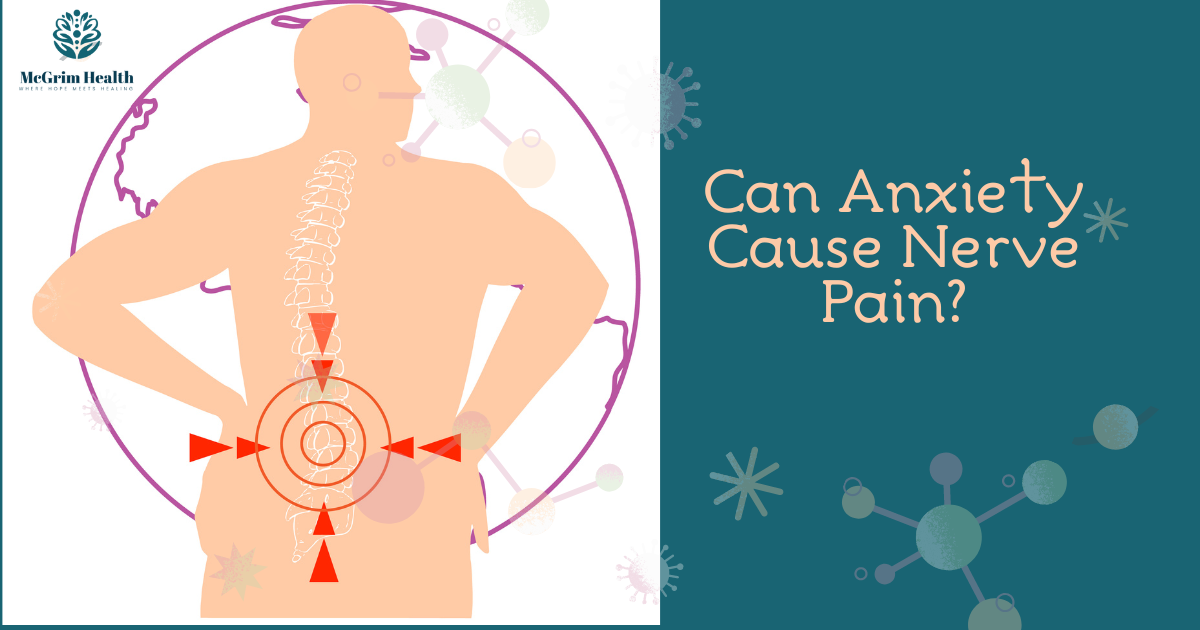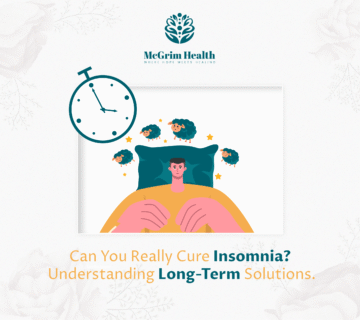Nerve pain is common in people with anxiety, but the reason isn’t clear. Millions suffer from anxiety’s emotional weight. However, they often ignore possible physical pain.
The link between mind and body is crucial, with nerve pain highlighting this. Understanding this connection is key for better treatments.
We need to look into anxiety’s side effects. This approach helps address both mental and physical problems.
Treatments must consider both aspects. Knowing “Can anxiety cause nerve pain?” is vital for those looking to relieve their anxiety. It leads to better health. Read on to learn more.
Dealing with anxiety can be challenging. However, rest assured, McGrim Health is here to assist you. We are dedicated to assisting you in conquering your health concerns.
Our team offers exceptional methods for managing anxiety. These consist of treatment, self-awareness techniques, and medication. Get in touch with us for additional details.
What Is Anxiety?
Anxiety is the most common mental health issue in the United States. It includes disorders such as:
- Generalized anxiety
- PTSD
- Panic disorder
- Phobias
- Social anxiety
- Obsessive-compulsive disorder
Stress causes anxiety by activating our body’s alarm system. This response can range from mild unease to intense fear. Symptoms often include:
- Sweating
- Trembling
- Dread
- Racing heart
While occasional anxiety is normal, chronic worry can be harmful. It could result in nerve pain and additional health problems.
Identifying these indications is crucial for controlling this frequent, but possibly disabling ailment.
What Is Nerve Pain?
Sharp, burning, or tingling sensations signal nerve pain (or neuropathy). This occurs when nerves malfunction due to various factors. Diabetes, infections, injuries, stress, and anxiety can all spark neuropathic issues.
Nerve pain changes form depending on its source and the damaged area.
- Peripheral: Impacts the extremities.
- Focal: Targets specific nerves.
- Autonomic: Disrupts involuntary functions.
Each type has unique challenges. Symptoms include pain in the hands and feet, muscle weakness, and impaired functions. Comprehending these differences helps with accurate identification and care.
Can Anxiety Cause Nerve Pain?
Anxiety worsens nerve pain by increasing sensitivity but doesn’t cause it. It makes discomfort feel more intense.
It creates an illusion, making neuropathy symptoms seem worse. So, our perception of pain rises.
What Impact Does Anxiety Have on Nerves?
People with anxiety might wonder, “Can anxiety cause neuropathy symptoms?” Anxiety impacts the nerves in different ways. It can imitate symptoms of the nervous system, such as neuropathy.
One instance of this occurs when anxiety causes shallow breathing and excessive breathing. This narrows blood vessels, reducing blood flow to the extremities.
Consequently, individuals might experience tingling or fiery feelings. These signs affect both circulation and nerve reactions.
Nervous activity can also be intensified by anxiety. This could result in tingling, burning feelings, or muscle spasms. These symptoms are similar to nerve injuries or neuropathy.
Heightened stress may exacerbate nerve pain, causing a blurry distinction between anxiety and nerve problems.
Anxiety-induced tension frequently leads to muscle pains and spasms. These signs can imitate neuropathy and impact any part of the body. Anxiety causes a range of discomforts.
Individuals experiencing anxiety may focus intensely on their physical sensations. They seek out tiny indicators or sensations that increase worry and hinder normal mobility.
As anxiety rises, symptoms similar to neuropathy also increase. Below are a few typical signs:
- Nerve Pain Anxiety Disorder: Ongoing sharp or burning pain.
- Anxiety and Tingling: Often anxiety in hands and anxiety in feet.
- Anxiety Arm Pain: Arms feeling heavy or weak.
- Leg Weakness Anxiety: Legs feeling heavy or weak.
Anxiety and right arm pain are also commonly experienced by many people. This could be concerning because it could resemble cardiac issues.
However, it should be highlighted that anxiety can lead to muscle tension and nerve compression, ultimately causing arm pain.
Can Peripheral Neuropathy Be Caused by Stress?
Stress has a connection to peripheral neuropathy but does not cause it directly. This disorder results in harm to nerves located beyond the brain and spinal cord.
Typical reasons for such occurrences are diabetes, infections, or injuries. Nevertheless, stress and peripheral neuropathy are intertwined, as stress can aggravate symptoms, intensifying pain and tingling.
It activates hormone secretion that increases inflammation and nerve pain. Prolonged stress can result in health problems that trigger peripheral neuropathy.
To alleviate symptoms, handle stress using relaxation techniques or consistent physical activity.
Does Stress Make Neuropathy Worse?
Stress can worsen neuropathy. It triggers the body to generate hormones like cortisol, resulting in increased inflammation and pain levels.
Its heightened inflammation exacerbates nerve damage and intensifies pain for people suffering from neuropathy.
Furthermore, muscle tension and poor posture caused by stress can also put a strain on nerves, worsening symptoms.
Using strategies such as relaxation, mindfulness, and other methods can ease stress and provide relief from its impacts.
Managing Anxiety and Nerve Pain
If you have nerve pain and anxiety, managing both is crucial. Here are some useful strategies:
-
Practice Mindfulness and Relaxation Techniques
Calm nerve pain with mental peace. Meditation and deep breathing reduce anxiety and physical pain. Mindfulness decreases stress, helping both mind and body.
-
Engage in Regular Exercise
Feeling tense? Move your body! Workouts improve mood and soothe nerves. Regular activity unlocks natural stress relief and enhances well-being. Exercise is your key to inner calm.
-
Consider Therapy
Anxiety’s roots become clear through professional guidance. CBT provides effective management techniques. It gives you coping strategies for lasting relief.
-
Explore Medication Options
Anxiety relief often begins with medication. As stress decreases, nerve pain may also ease. Some consider this method crucial for effective management.
Conclusion
So, can anxiety cause nerve pain? Anxiety does not harm nerves, but it can imitate nerve pain. Muscle tension resulting from stress and anxiety can lead to nerve compression. This results in unease.
Understanding the connection between anxiety and nerve pain is essential for successful treatment. Methods such as mindfulness, physical activity, and counseling can be effective. They alleviate nerve pain caused by anxiety.
However, persistent or severe pain needs a doctor’s attention to exclude other issues. A comprehensive strategy is frequently necessary. However, relief and an improved quality of life are achievable with suitable support and strategies.
FAQs
Can anxiety cause neurological problems?
Yes, anxiety can lead to neurological problems by making stress worse, which might cause issues like headaches and nerve pain.
Can anxiety cause joint pain in fingers?
Anxiety can lead to a sensation of tingling and numbness in the fingers. It might be perceived as pain in the joints.
Can a pinched nerve cause panic attack?
A pinched nerve can cause severe pain. This may trigger panic attacks. The pain activates the body’s stress response.
Can anxiety cause burning sensation in legs?
Yes, Anxiety raises stress and tenses muscles. It causes a burning in the legs, like the fight or flight response.
When should I arrange to see a doctor for nerve pain?
If you have severe nerve pain and anxiety, consult a doctor to diagnose and treat the cause.





No comment